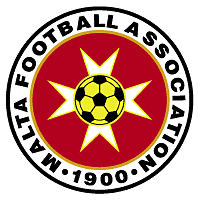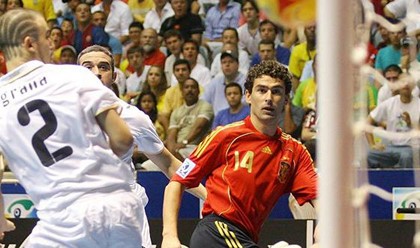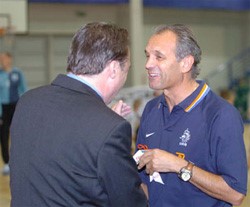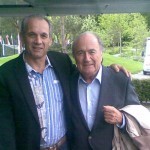
Newspaper report
Vic Hermans

05/09/2011
Interesting report from Malta
Courtesy: Sport in Malta
“If I see I cannot develop Futsal any further I will quit” – Vic Hermans
Monday, September 5, 2011 by Sandro Micallef
Dutch Futsal coach Vic Hermans has sent a strong and direct message to the MFA administration by being very straight forward and to the point about the current MFA Futsal regulations.
Despite having woken up the day after the Malta National Futsal team registered its very first ever historical home win in a full international match, Hermans showed little pride and joy when addressing a last minute call media conference at the Excelsior.
“When I look back at the two years I have spent here I realize that we have gone from strength to strength tactically in Futsal but there are other things that worry me and I am not happy about at the moment”
The Malta National Futsal coach was referring to the fact that the present MFA statute and players registrations regulations do not pave way for talented players who are currently playing 11 a side to play the indoor 5 a side match Futsal.
“I have been facing a awkward situation whereby some of my National team players were not given permission from their senior A team coach to come for training and for Malta International games”
He added, that whilst he admits that Football is much more popular than Futsal, coaches of senior teams must allow players to choose when to play Football and Futsal concurrently.
“I have been stressing the fact with the MFA that amateur players must be allowed to play both 11 a side football with their senior team and also Futsal at the same time.
At present an amateur player playing for a Second Division side in the BOV MFA 2nd Div league cannot play with a Futsal team unless his senior Club signs a loan form for a year. On the other hand if the same player is not property of that 2nd Div Club (example the player is of Tarxien Rainbows and is loaned to Birzebbugia FC) that player cannot play Futsal because he is already loaned, and MFA regulations as they stand today permit only one loan per season for each player.
“I have worked and coached in Hong Kong, Malysia, Qatar, Iran and Holland and at a certain time I always looked at the mirror and said that if I accomplished a target or cannot go further due to problems I decide to quit”
Hermans who’s contract with MFA expires in May 2012 is determined not to commence discussions to renew his contract with the MFA if things do not change with immediate effect.
He also mentioned the fact that the MFA did not give the go ahead as yet for the Malta National Futsal team to play a preparation away match against Czech Republic on the eve of the Euro Futsal qualifiers scheduled for October in Georgia, as according to him the MFA said it costs a lot of money.
Disappointed with low public turn out
In his welcome address earlier Mark Muscat the Malta National team’s Media officer showed his disappointment at the fact that the general public did not turn up once again to support the Malta Futsal team even though the entrance was free. He encouraged the domestic Futsal teams to try and turn up to support Futsal in general.
John Cutajar Malta’s captain said that the lack of supporters might be the result of the lack of wins when Malta played home. He is now hopeful that after this first home win the general public will start to believe in the capabilities of the players.
Xavier Saliba Malta’s match winner yesterday against Switzerland, said that it was a very tough match against the Swiss but he could tell from the start that Malta would register the win since it was Malta who dictated the game from the start. He publically thanked Hermans for his ongoing support to the Malta National team players and also to the Maltese Futsal in general.
Robert Gatt – Now we will change Futsal. According to the MFA’s Technical Director it is now time for the MFA to tackle Futsal and enhance/improve the game seriously.
Robert Gatt said “We changed a lot in local Football, and I think now it is the turn for Futsal to register the desired improvement”
Asked why it was decided specifically now to invest in Futsal after 12 long years that the game has been played in Malta, Gatt bravely dribbled the question by stating that the MFA is helping in the way it could.
When pressed why was the case that the MFA has invested heavily in beach soccer lately instead of targeting the improvement of Futsal the ex-Hibernains coach replied to this site “I have only been in the job for seven months, I cannot speak and explain why certain decisions were taken before, what I can say is that after we have settled Beach Soccer now we will also settle Futsal”
A notable absence at today’s Press Conference was Malta’s official Assistant coach Kevin Mifsud who has been recently appointed to assist Hermans with the Malta Futsal team. Another absence was that of Donald Spiteri who is the person who is trying to push Futsal within the MFA structures gradually. Spiteri is believed to have initiated lobbying for the set up of the Malta Futsal Association which will surely give a positive vibe to this sport.

NZZ Online, 12. August 2011 09:27:00
Die Wurzeln des «Tiki-Taka»
Der holländische Fifa-Ausbilder Vic Hermans über den Erfolg des spanischen Fussballs
Auch im Futsal gehören die Spanier zur absoluten Weltspitze.
(Bild: Imago)
Die Fifa propagiert Futsal, das Spiel 5 gegen 5 in der Halle, als Zukunft des Fussballsports. Seine Pluspunkte sind vorab die kleineren Felder und die Unabhängigkeit vom Wetter. Doch Futsal ist in Wahrheit eine eigene Sportart.
Mit Vic Hermanns sprach Perikles Monioudis
NZZ Online: Futsal, der fútbol sal, wird in der Halle und auf Handballtore gespielt. Der Ball ist kleiner und schwerer als im Rasenfussball. Weshalb sollte man sich das antun?
Vic Hermanns: Die Vorbehalte gegen Futsal als eigenständige Sportart sind in der Tat nicht klein. Die Sache ist, dass man Futsal nicht am Rasenfussball messen darf.
Warum nicht?
Futsal ist ein eigener Sport. Im Unterschied zum Rasenfussball handelt es sich um eine Intervallsportart wie das Eishockey. Sie wird mit hohem Tempo gespielt. Die Spieler können laufend ein- und auswechseln. Futsal genügt so seinen eigenen Regeln und hat seine eigene Schönheit.
Was macht für Sie als Spieler und Coach den Reiz dieses Sports aus?
Die Verschärfung des Tempos und damit einhergehend die nötige technische Finesse. Man hat nicht so viel Zeit wie auf dem Rasen beim Annehmen des Balls, muss schneller passen, schneller laufen und damit taktisch auch sehr gut geschult sein. Bis vor kurzem war das Bodentackling verboten, man musste mehr mit Geschicklichkeit denn mit Kraft agieren. Das Kurzpassspiel ist hier der Schlüssel zum Erfolg.
Spielschwache Teams operieren im Rasenfussball bevorzugt mit hohen Bällen.
Im englischen Kick-and-Rush aus der fussballerischen Urzeit suchen auch im Futsal schwache Teams ihr Glück. Denn Offside kennt das Futsal-Regelwerk nicht. Erfolg aber kann man heute – grundsätzlich im Fussball – nur mit einem technisch anspruchsvollen Kurzpassspiel haben.
Der FC Barcelona und die spanische Nationalteam haben das der Fussballwelt eindrücklich vor Augen geführt.
Im FC Barcelona üben alle Spieler bis zum Alter von 12 Jahren das 4 gegen 4 ausgiebig, und viele Spanier, etwa die Weltmeister Andrés Iniesta und Xavi, bekamen im Futsal ihren ersten Spielerpass. Was sie heute auf Rasen praktizieren, haben sie in der Halle gelernt. Die Grundsituation im Team, auf engem Raum mit hohem Tempo dem Ballführenden stets zwei Anspielstationen zu bieten, führt dazu, dass der Ball im Dreieck gespielt wird. Die Spieler legen so im übertragenen Sinn Dreiecke hin, bis der öffnende Pass in die Tiefe, die Torvorlage, gespielt werden kann.
Die Spanier nennen dies «Tiki-Taka» – eine Erfindung aus dem Futsal?
Das Kurzpassspiel, auch das spanische «Tiki-Taka», ist die Urzelle des Fussballs moderner Prägung, und im Futsal lernt man es besonders früh und besonders gründlich. Die Übungsanlage 4 gegen 4 kennt man sowohl im Futsal als auch im Rasenfussball. Setzt man dem 1-2-1 ein weiteres an, so entsteht ein Mittelfeld in der Form des «Diamanten», der von vielen Klubs praktiziert wird. Futsal ist deswegen für die Entwicklung des Fussballspielers sehr wichtig.
Zu Vic Hermans
Der Holländer Vic Hermans, geboren 1953, ist Fifa-Ausbilder im Futsal. Als Rasenspieler war er unter anderem bei der MVV Maastricht unter Vertrag. Er war 23 Jahre lang als Futsal-Spieler aktiv. 12 Jahre lang führte er die holländische Futsal-Nationalmannschaft als Captain an. An der ersten Fifa-Futsal-WM 1989 in Holland wurde er als bester Spieler ausgezeichnet.
Als Futsal-Ausbilder hat er in vielen Verbänden gewirkt, unter anderem acht Jahre lang im holländischen Fussballverband (KNVB), und als Nationalcoach etwa in Hongkong, Malaysia und Iran. Zurzeit ist Hermans als Head im Technical Center des maltesischen Fussballverbands tätig.
Ist Futsal nur für Youngsters interessant?
Besonders für Kinder und Jugendliche, sie entscheiden sich dann in aller Regel im Alter zwischen 14 und 16 Jahren, ob sie im Rasenfussball weitermachen oder in der Halle bleiben. Man muss sich den Fussball grundsätzlich als Breitensport vorstellen, denn weltweit sind nur 0,2 % aller Spieler Professionals. Von all jenen, die in der Ausbildungspyramide nach oben kommen, schaffen es nur sehr wenige ganz nach oben. Der überwiegende Teil derer, die in den oberen Bereich der Pyramide vorstossen, purzelt sozusagen schnell wieder von dort hinunter. Futsal kann ihnen eine Karriere im Fussball als Aktiver oder Ausbilder ermöglichen, die sie sonst nicht erleben könnten.
Gilt das auch für den Frauenfussball?
In den Futsal der Frauen ist Bewegung gekommen. Zumindest ist da die Konkurrenz durch Beach-Soccer nicht so gross wie bei den Männern.
Wann wird Futsal olympisch?
Der Rasenfussball hatte es sehr schwer. Futsal wird es in absehbarer Zeit nicht schaffen, olympisch zu werden. Aber wir arbeiten daran.


02/05/2010
Maltese Futsal: national team head coach interview
Courtesy: Times of Malta
Hermans keen to leave lasting legacy
by Kevin Azzopardi
Vic Hermans walked into Maltese football without much fanfare last summer but in the nine months he’s been plying his trade here, the Dutch coach has become synonymous with the game of futsal.
Universally acclaimed as one of the leading futsal experts worldwide, Hermans had initially been sounded out by Malta FA president Joe Mifsud to help him earmark a suitable candidate to take over from Czech Michael Striz as coach of the national futsal team.
“I met Dr Mifsud at the 2008 U-21 Futsal Championship in Russia,” Hermans recalled when we met for an interview at the Corradino Pavilion, the country’s hub of five-a-side football.
“Dr Mifsud asked me if I knew someone who could develop futsal in Malta. Having been to countries like Iran, Hong Kong and Malaysia as FIFA instructor for futsal, I said to Dr Mifsud that this was what I specialise in.
“The MFA president told me something like ‘I don’t think we can persuade you to work in Malta’ but I replied: ‘We can talk about it’.
“In February 2009, I met Dr Mifsud in Malta. During my stay here, I watched Malta play in a UEFA qualifying tournament.
“We decided to speak again and in August I signed a three-year contract with the Malta FA with an option to extend it for another two years.”
Before venturing into coaching, Hermans had a glittering career as a futsal player. For 12 years, he was a key member of the Dutch team and in 1989, he was named Most Valuable Player at the first World Championship, held in Holland.
In the early years of his coaching career, Hermans had spells with Dutch club Roda JC and Lommel in Belgium before deciding to devote all his attention to futsal.
For nine years, Hermans was in charge of the futsal sector in his home country where he implemented a new programme aimed at boosting the level of the game in Holland. He also masterminded the country’s qualification to the 2005 Euro Championships.
Hermans revealed he had received offers to coach five-a-side clubs elsewhere but opted to take the Malta job instead.
“I had offers from clubs in Russia and Spain but I chose Malta because I prefer to coach to a national team,” Hermans said.
“I’ve been involved in coaching on a national level for 20 years. For me, coaching a national team is a long-term project whereas with clubs, you’re pushing for results straightaway.”
Given his remarkable CV, Hermans’s appointment as national futsal coach ought to have been given significant exposure in the local media but his unveiling was overshadowed by the announcement that John Buttigieg had stepped in as Malta coach after Dusan Fitzel had to relinquish his duties because of health problems.
Unflustered by the lack of publicity surrounding his appointment, Hermans set about the task of improving and strengthening the structure of futsal in Malta.
“One of my main challenges is to improve the organisation of the futsal teams,” Hermans said.
“The Division One clubs must work harder to bolster their technical set-up which should be made up of professional people like coach, assistant coach and physiotherapist.
“As for the level of the game, there is certainly room for progress but I’ve been heartened by the response of the teams. In domestic games, I’ve seen teams adopt certain tactics and moves that we practise in training with the national squad. This shows that teams are learning from the experience of their national players.
“I’ve seen some positive developments over the past eight months. Recently, I was watching a local game when Paola Downtown took off their goalkeeper and put in another outfield player.
The players in the national squad train twice every week with Hermans.
“At present, I have a squad of 20,” Hermans said.
“The idea is to foster stronger competition among the players. From the previous squad, I only retained four players and one of the newcomers is Jonathan Magri Overend (a former Malta international).”
Targets
Hermans is keen to raise the level of Maltese players in a tactical and technical sense but he’s also championing radical changes to the game’s overall structure.
“There are many areas I would like to improve,” Hermans said.
“The collective movement of players, set-pieces and the ‘flying goalkeeper’ option are important areas but I also want to improve the competition structure. There are 84 teams in four divisions but players need permission from the Malta FA to play futsal.
“What I’m suggesting is that, to aid the development of young players, we should introduce a futsal competition for youths who are registered with local football clubs. Once a week, the youths will play five-a-side at an indoor venue. There is certainly room for more co-operation between football and futsal.
“We need to start grooming futsal players early. There are 881 registered futsal players in Malta and 50 per cent are over 30. It’s an inverted pyramid but I want to change things. The existing rules make it difficult to attract youngsters but reducing the average age of futsal players is one of my top priorities.”
Like every other coach, Hermans also wants to leave his mark by leading his team to new heights.
“My first target is for Malta to win a competitive game in futsal,” he said.
“I also hope that the national team win a preliminary tournament during my time here. It’s difficult, I know, but I believe we can do it.”


Maastrichtenaar Vic Hermans geeft zaalvoetbalcursus in Palestina
Posted on March 16th 2010
Vic Hermans met Fifa baas Sepp Blatter
Voormalig zaalvoetbal international en huidig bondscoach van Malta op vele fronten actief.
Maastrichtenaar Vic Hermans is sinds verleden jaar zaalvoetbalbondscoach van Malta. Het land dat met de hoofdstad Valetta, een helft van het jaar 2018 Culturele Hoofdstad van Europa is. De ex-international is niet alleen actief als voetbalcoach op het Middellandse Zee eiland.
Vic Hermans, voor wie bekend is met de hoogtijdagen van het zaalvoetbal in Zuid Limburg, was in de jaren tachtig een van de smaakmakers van het zaalvoetbal. De sport die zich toen der tijd kon verheugen op een enorme populariteit. De sporthallen in Zuid Limburg puilde iedere maandagavond uit. Dat was te danken aan een aantal factoren. Er was ieder jaar weer een enorme spannende competitie op het hoogste niveau. Teams als De Drei Keuninge en Rousseau uit Maastricht, De Haantjes uit Beek, Keelkampers uit Nuth en Bouwfonds en Merpati uit Geleen waren enorm aan elkaar gewaagd. Tevens telde ieder team wel een of meerdere vedetten. Jopie Titulay en de broertjes Fransiscus, de broertjes Bastiaens, Gilbert Heijgele, Pierre Bouvrie, Marcel Loosveld en uiteraard Vic Hermans. Allen zeer begaafde technische voetballers die ook nog eens gezonde rivalen van elkaar waren trokken veel toeschouwers.
De frêle Vic Hermans ging als een van de weinigen van zaalvoetbal zijn beroep maken. Zo kwam hij terecht bij de KNVB en schopte het tot bondscoach van het nationale zaalvoetbalteam dat inmiddels Futsal heet.
Verleden jaar nam hij afscheid van Nederland en werd bondscoach van Malta. Daar heeft hij inmiddels volledig zijn draai gevonden. Niet alleen als trainer maar ook sociaal opzicht. Op zes april geeft hij aan Maltezer zakenlieden, op verzoek van de Nederlandse ambassadeur in Malta, Rob Gabriëlse, een lezing over samenwerking tussen Nederland en Malta.
De Maastrichtenaar is trouwens niet alleen actief in en voor Malta. Ook de wereldvoetbalbond FIFA maakt regelmatig gebruik van de ruime zaalvoetbalervaringen van Hermans. Zo gaat hij midden april een week lang een cursus Futsal geven in Palestina.
De eerste april gaat Hermans echter eerst met de Maltezer internationals naar Engeland. Van 1 tot en met 4 april wordt daar een vierlandentoernooi gespeeld.






